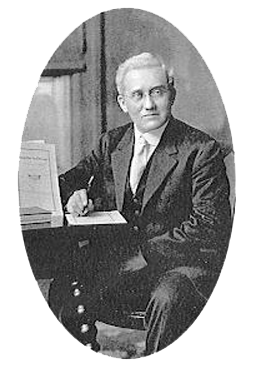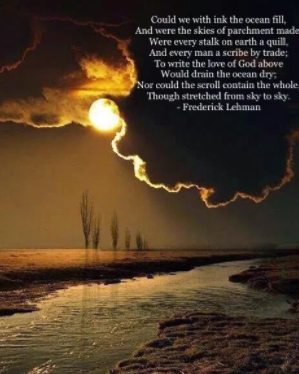At this morning’s service Pastor Horner spoke of the love of God.
 God is Love.
God is Love.- This is not just one of his attributes but His very nature.
- If you are a stranger to the love of God you cannot understand the love of God.
- God does not respond through a human emotion, but he responds because He is Love.
- If we have real love for God we will desire to please Him with obedience to the Scriptures.
- Love each other
- Love our wife or husband with a deeper love
- God loved his people before he created anything
- His love is forever
The love of God is to be lived as well as learned. The love of God for us produces love in us for him and for others.
Woody Webster played a beautiful saxophone solo of the hymn, “The Love of God” by Fredrick M Lehman.
Enjoy the video below with a beautiful rendition of this hymn.
Today’s hymn had its roots in an ancient (eleventh century) Jewish poem called the Hadamut.
The poem was originally composed in Aramaic, consisting of ninety couplets or verses, by Rabbi Mayer, son of Isaac Nehorai, a cantor in Worms, Germany. The poem is most often read in a responsive manner in some synagogues during the Jewish holiday of Shavuos (Feast of Weeks) – the Torah reader singing two verses and the congregants singing the next two and so on.
The Jewish poem begins by extolling the greatness of God and then goes on to describe a miracle, although opinions vary as to what the actual miracle was (or if there really was one at all). Some have interpreted it to mean that the Jews were facing extermination if a non-Jewish priest was successful in defending his beliefs. However, the Jewish priest triumphed and the Jews in Worms were spared.
Fast forward 800 years . . .
Fast forward about eight hundred years or so when the third stanza of this epic poem was found penciled on the walls of an insane asylum:
Were the sky of parchment made,
A quill each reed, each twig and blade,
Could we with ink the oceans fill,
Were every man a scribe of skill,
The marvelous story, Of God’s great glory
Would still remain untold; For He, most high
The earth and sky Created alone of old.
An evangelist in the late 1890’s concluded his message by quoting these scrawled verses. At the meeting, and making notes, was songwriter Frederick H. Lehman. Lehman, born in Germany in 1868, immigrated with his family at age four and lived in Iowa. At the age of eleven, he made his commitment to Christ.
Lehman studied at Northwestern College in Naperville, Illinois and later pastored churches in Iowa, Indiana and Missouri. However, he devoted most of his career to writing hundreds of gospel songs. In 1911 he helped to found the Nazarene Publishing House in Kansas City, Missouri.
Apparently, Lehman had tucked away the memories of the words he jotted down years before. In 1917, inspired by the Jewish poem’s third stanza, he wrote two additional stanzas and a chorus to accompany it. In a pamphlet written in 1948, Lehman described the experience of writing the song:
 While at a camp meeting in a mid-western state, some fifty years ago in our early ministry, an evangelist climaxed his message by quoting the last stanza of this song. The profound depths of the lines moved us to preserve the words for future generations.
While at a camp meeting in a mid-western state, some fifty years ago in our early ministry, an evangelist climaxed his message by quoting the last stanza of this song. The profound depths of the lines moved us to preserve the words for future generations.
Not until we had come to California did this urge find fulfillment, and that at a time when circumstances forced us to hard manual labor. One day, during short intervals of inattention to our work, we picked up a scrap of paper and, seated upon an empty lemon box pushed against the wall, with a stub pencil, added the (first) two stanzas and chorus of the song. . . Since the lines (3rd stanza from the Jewish poem) had been found penciled on the wall of patient’s room in an insane asylum after he had been carried to his grave, the general opinion was that this inmate had written the epic in moments of sanity.
The key stanza (third verse) under question as to its authorship was written nearly one thousand years ago by a Jewish songwriter, and put on the scorepage by F.M. Lehman, a Gentile songwriter, in 1917. (101 More Hymn Stories by Kenneth Osbeck)
The song, written and published in 1917 (his daughter Claudia arranged the music) by Frederick M. Lehman, a German Gentile, remains a beloved hymn of the Church today:
 The love of God is greater far
The love of God is greater far
Than tongue or pen can ever tell;
It goes beyond the highest star,
And reaches to the lowest hell;
The guilty pair, bowed down with care,
God gave His Son to win;
His erring child He reconciled,
And pardoned from his sin.
Refrain
O love of God, how rich and pure!
How measureless and strong!
It shall forevermore endure
The saints’ and angels’ song.
 When years of time shall pass away,
When years of time shall pass away,
And earthly thrones and kingdoms fall,
When men, who here refuse to pray,
On rocks and hills and mountains call,
God’s love so sure, shall still endure,
All measureless and strong;
Redeeming grace to Adam’s race—
The saints’ and angels’ song.
Could we with ink the ocean fill,
And were the skies of parchment made,
Were every stalk on earth a quill,
And every man a scribe by trade,
To write the love of God above,
Would drain the ocean dry.
Nor could the scroll contain the whole,
Though stretched from sky to sky.
Have a GREAT day . . . someday it will be HISTORY!

Follow Us!